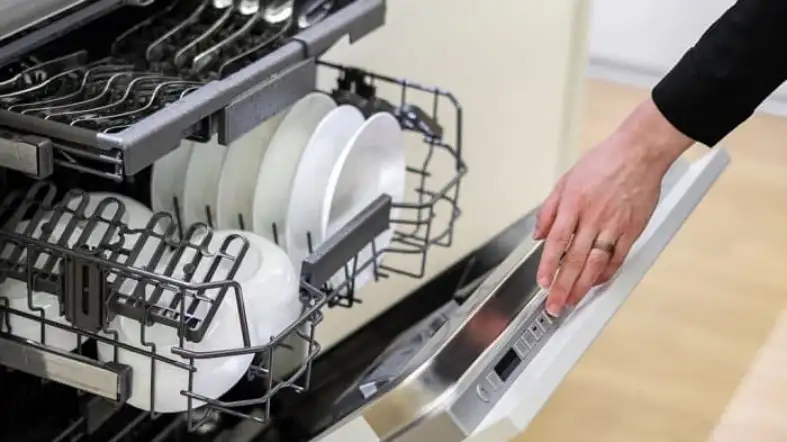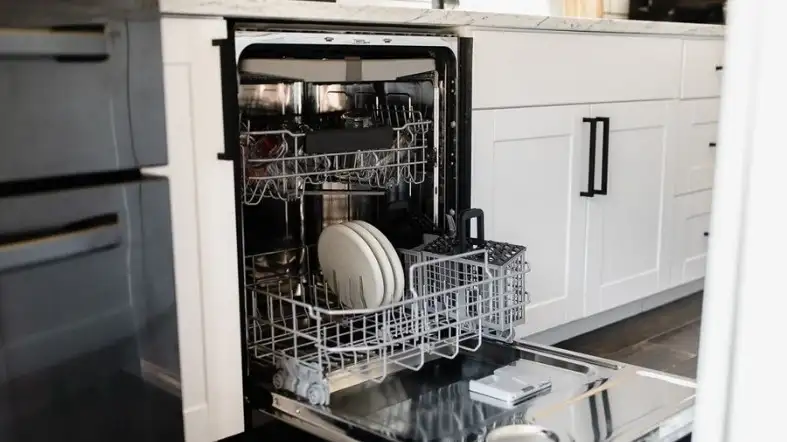Are you wondering if you should get a dishwasher 15- or 20-amp motor? You’re not alone! A lot of people are asking that question.
In this article, we’ll help you decide which dishwasher is suitable for you. Keep reading to know more details!
Dishwasher 15 Or 20 AMP
This indicates the circuit breaker size for a dishwasher. A 15 amp dishwasher will require a dedicated 120/125-volt and fed a 14/2 NM wire.

On the other hand, in certain houses, both the dishwasher and garbage disposal are connected to a 20-amp circuit.
Besides, A 12/2 NM wire is fed for this 20-amp circuit. Keep in mind that Amp usage will vary by brand and model.
Can A Dishwasher Be Plugged Into A Regular Outlet?
It’s OK to connect your dishwasher to a nearby outlet if specific criteria are met, even if you don’t want to hardwire it.
To connect your dishwasher to a regular outlet, follow the below guidelines:
The first step is to ensure that the outlet is not located immediately behind or in close proximity to the dishwasher.
Any electrical outlet inside the housing where the dishwasher is installed should be removed and should never be used.
Remember that while dishwashers are designed to be durable, leaks may always occur.
You wouldn’t want water to seep into a live electrical socket after leaking from seals.
Second, look for a 120-volt outlet within range of the pigtail cable of the dishwasher.
The ideal spot is in the cabinet area beside the dishwasher’s housing. If there isn’t one already and you’d want one installed, that’s fine.
An expert electrician can easily handle this for you. But in some locations, residents will be able to maintain their own internal wiring.
If you choose to tackle this yourself and have never done it before, please do your homework thoroughly so as not to cause significant accidents or fires.
Finally, make sure that any outlet you intend to connect your dishwasher to is a GFCI outlet. These outlets will have two small reset buttons between the plug slots.
The National Electrical Code requires these outlets in or near damp/wet locations because of their size and location.
These are the locations where you’ll find your dishwasher. These outlets immediately cut off power to the outlet when liquid comes in contact with it, preventing your breaker from being tripped. This protects your wiring and appliance from harm.
Things To Consider When Choosing A Dishwasher

Now that you know all about the types of outlets and breakers you’ll need for your dishwasher, it’s time to look at some other factors to help you choose the perfect one for your home. Let’s briefly touch on some of the most critical considerations:
Size Matters
Dishwashers come in a few different sizes. The size of your dishwasher will be determined by the space you have available in your kitchen.
If you have a large family or entertain often, you’ll want to choose a dishwasher that can accommodate a lot of dishes.
On the other hand, if you live alone or have a small family, you might be able to get away with a smaller dishwasher.
Drying Performance
You’ll also want to think about how well the dishwasher dries the dishes. Some dishwashers have a built-in heated drying element that dries the dishes very well.
Other dishwashers rely on air circulation to dry the dishes, which can leave them wet.
If you’re concerned about drying performance, you might want to choose a dishwasher with a heated drying element.
Cleaning Performance

When you’re shopping for a dishwasher, you’ll want to consider how well it cleans.
Some dishwashers have sensors that can adjust the cycle time and water temperature based on how dirty the dishes are.
Other dishwashers have different cleaning settings that you can choose from based on how dirty the dishes are.
If you have a lot of dishes that are very dirty, you’ll want to choose a dishwasher with solid cleaning performance.
Ease Of Use
You must consider how easy the dishwasher is to use. Some dishwashers have a lot of different settings and options that can be confusing to use.
Other dishwashers are very simple and straightforward to use. If you’re not sure which type of dishwasher is right for you, it might be a good idea to ask a salesperson for help.
Quiet Operation
If you have an open concept kitchen, you’ll want to choose a quiet dishwasher, so it doesn’t disrupt your daily life.
There are a lot of dishwashers on the market that boast quiet operation, so be sure to compare a few before you make your final decision.
FAQs
How Many Amps Does A Dishwasher Draw?
Knowing how much amp your dishwasher will use can help you understand how much power it needs.
The average dishwasher will use around 6-8 amps. Some models may use as little as 10 amps, while others may use up to 15 amps. But most household dishwashers use 10 amps.
Why Does Dishwasher Size Matter?
When it comes to dishwashers, size does matter. A larger dishwasher will require more amps to operate than a smaller one.
If you have a large family or entertain often, you’ll want to choose a dishwasher with a higher amp rating.
That way, you can be sure it will have the power it needs to clean all your dishes.
Does A Dishwasher Need To Be On Its Own Circuit?
Most dishwashers will need to be on their own circuit. That way, they won’t trip the breaker when they’re running.
If you have a dishwasher that is 10 amps or less, you can usually put it on the same circuit as your garbage disposal.
But if your dishwasher is 15 amps or more, you’ll need to put it on its own circuit.
Final Thoughts
Finally, be sure to pick a dishwasher that is the right size for your home and needs.
Besides, before buying, make sure to check the amps so you know how much power it needs.
We hope that now you know everything you need to make an informed decision when purchasing a dishwasher.

